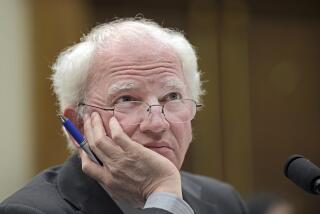Court Orders Disbarment of Attorney in Libya Deal
- Share via
SAN FRANCISCO — The state Supreme Court on Monday ordered the disbarment of a Rancho Mirage attorney who claimed he had been tricked into joining a conspiracy to smuggle 20 tons of plastic explosives to Libya in 1977.
The justices unanimously upheld the penalty the State Bar recommended against Edward J. Bloom, 79, who had been convicted and placed on probation in 1983 on federal charges of conspiring to violate U.S. munitions and shipping laws.
Federal authorities charged that Bloom plotted with former CIA agent Edwin P. Wilson and others in the conspiracy and received $10,000 for helping arrange the covert shipment of the explosives from this country to Libya. Wilson was convicted and sent to prison for his role in the plot.
In a 13-page unsigned opinion, the state court Monday rejected Bloom’s contention that he still should be allowed to practice law because he had been told at the time that the smuggling operation had been authorized by the National Security Council.
Documents Were Falsified
The justices noted that both the federal trial court and State Bar investigators had refused to accept Bloom’s claim that he had believed, “in good faith,” that the operation was thus legal.
Bloom had “willingly participated” in a deceptive scheme, including the deliberate falsification of documents, to unlawfully ship munitions to a foreign country, the justices found.
“Such conduct is inimical both to the high ethical standards of honesty and integrity required of the members of the profession and to promoting confidence in the trustworthiness of members of the legal profession,” the state court opinion said.
The seriousness of his crimes outweighed any potentially mitigating factors, such as his advanced age and lack of prior professional discipline since admission to the Bar in 1932, the court said.
In its investigation of the case, a State Bar hearing panel found that Bloom had joined in the plot with Pomona munitions dealer Jerome S. Brower, a client of Bloom’s who had met with Wilson and some Libyan nationals who wanted the explosives. Brower later went to prison for his role in the conspiracy.
Bloom traveled to Europe to pick up money from a Swiss bank account and took it to three manufacturers from whom Brower had arranged to obtain the explosives, the panel said.
The explosives were repackaged, labeled “drilling mud,” and shipped under a false export declaration to Lisbon and then to Libya, the panel said.
Bloom helped arrange the shipment and had ridden in the leased plane that carried the illicit cargo, sitting on one of the containers of explosives, the Bar panel said.
Medal Was ‘Protection’
In his defense, Bloom claimed Brower had told him the operation was legal and had given him a silver medallion, inscribed “God, Man & Country,” that Brower said was an NSC identification piece. If customs officials questioned the shipment, he was to show them the coin and he would not be detained, Bloom said.
Brower, testifying at Bloom’s trial, denied he had told Bloom any such thing. Federal prosecutors presented an affidavit saying the medallion was not NSC material and probably was one of many coins mass-produced by a private company.
Bloom could not be reached for comment Monday.
More to Read
Sign up for Essential California
The most important California stories and recommendations in your inbox every morning.
You may occasionally receive promotional content from the Los Angeles Times.









